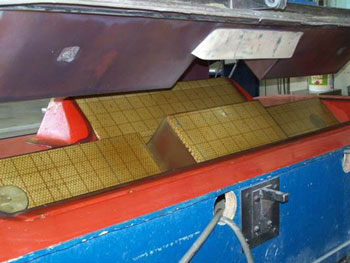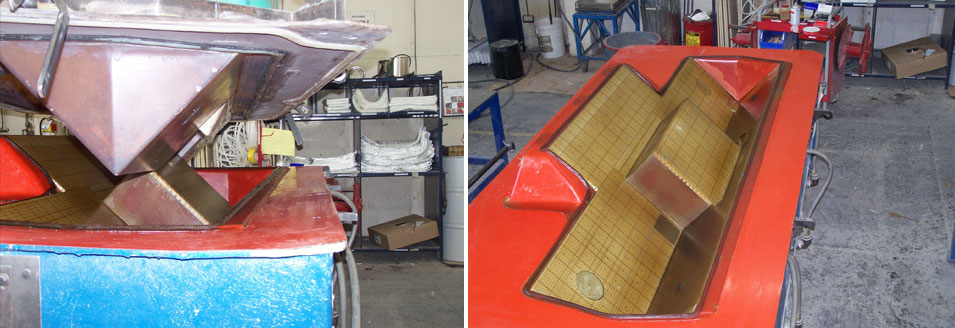
RTM-lite low floor bus rear step de-molding
RTM Process:
RMC is the only true RTM molder in its market region. This closed, resin injection molding technology is typified by rigid cavity and counter molds. Both are usually glass-reinforced, low-profile polyester resin, often backed with a mass-cast bolster with heating and cooling lines and steel edging, mounted in a steel frame, actuated by a hydraulic or pneumatic press. The finish is tooling gel-coat, waxed & buffed to Class “A”. More durable nickel-shell tooling is also used.
Typical volumes range from 1,000 to 10,000 parts per annum. Parts are finished on both sides; thickness control, high glass fraction, superior strength and good surface finish are the hallmarks of this process.
Parts must always be painted. Tooling is expensive and durable.
RTM-lite Proccess:
A closed molding process utilizing a rigid, flanged mold (core or cavity) and a flexible or lightly-reinforced counter mold. After gel-coating, dry reinforcement is loaded into the mold; it is closed, the space between the mold/counter mold is evacuated, and catalyzed resin is drawn into the cavity, saturating the reinforcement. Typically, there is a shorter cure cycle, and a higher glass-to-resin ratio compared to hand-laid parts. LRTM mold construction and its atmospheric mold clamping pressures limit overall in-mold pressures to less than 0.5 bar (8 psi), thus limiting the resin flow rates into the mold to lower than those typical of full RTM. The main advantages over open molding are: better thickness control, smoother quality of the “B” side surface, geometry on the “B” side can differ from that of the “A” surface, mechanical properties are superior to hand laid parts, and CLTE is considerably less. RTML is not recommended for parts requiring a cosmetic gel-coat finish, being primarily specified for parts with a paint finish.
Mold:
LRTM tooling costs are basically half the price of equivalent RTM molds because the counter mold can range from a simple, disposable bag to a glass-reinforced polyester shell. Production through-put is half the rate of RTM, in the range of 2 – 4 parts per mold per shift, depending on complexity. The process is a less tooling intensive, less volume sensitive means of producing closed molded FRP parts. Typical life span: 800 – 1500 parts before the mold is scrapped.

